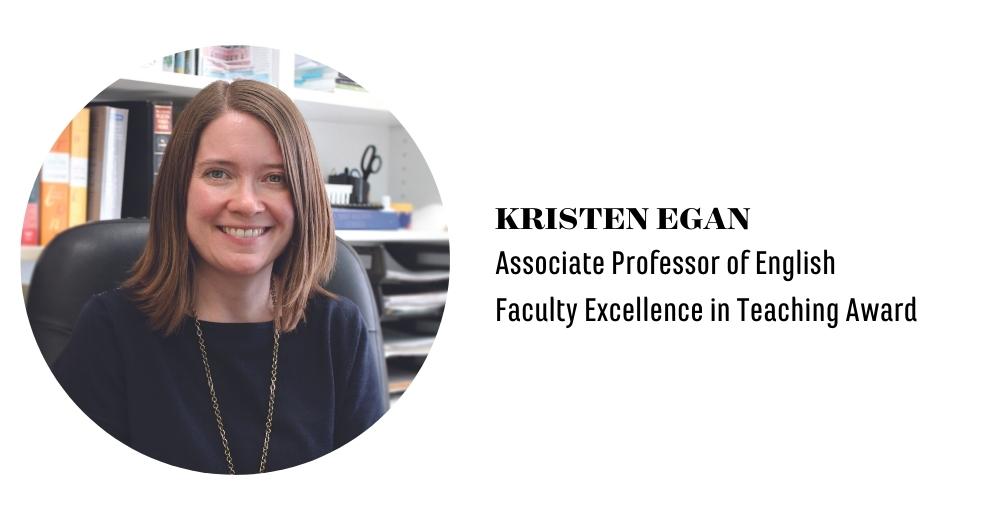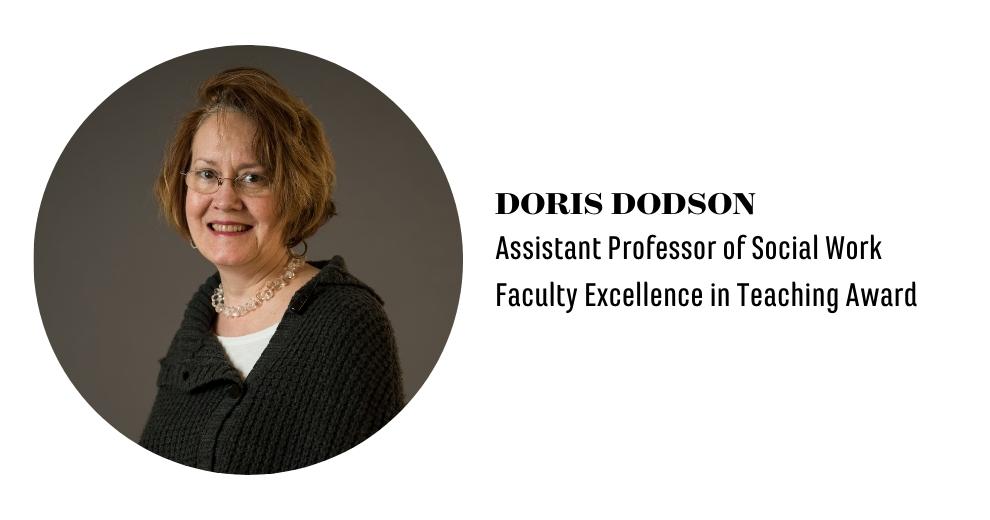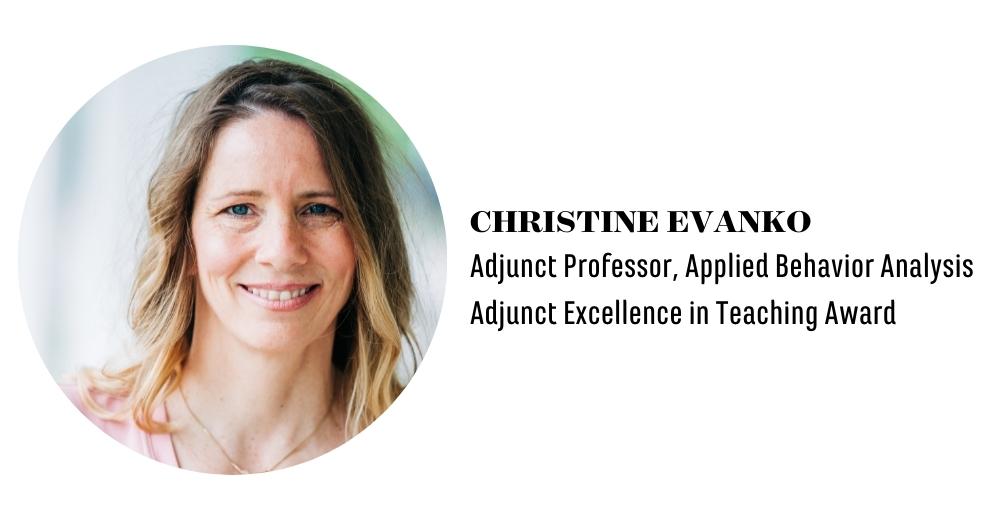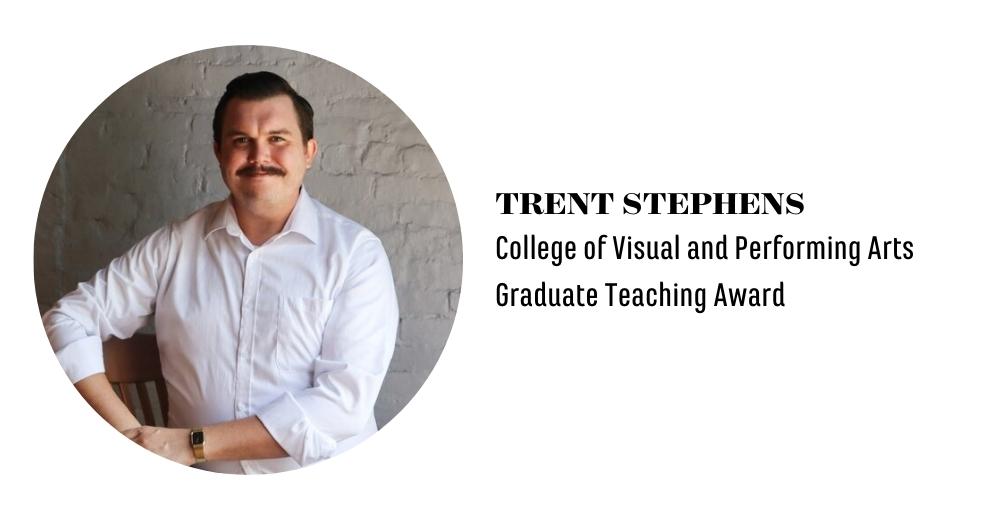The Mary Baldwin Excellence in Teaching Awards were established in 2019 to celebrate the academic passion, dedication, and mastery of craft that lays at the heart of the MBU experience.
We’d like to take a moment to ask our #MBUfamily members to join us in congratulating this year’s winners:
Faculty Excellence in Teaching Award: Dr. Kristen Egan, College of Arts and Sciences; Doris Dodson, College of Business and Professional Studies
Part-time / Adjunct Excellence in Teaching Award: Dr. Christy Evanko, College of Education
Graduate Teaching Award: Trent Stephens, College of Visual and Performing Arts
Below, recipients share thoughts about their path to MBU, why they love their jobs, and what goes into creating exemplary educational experiences.

Tell us a bit about your path to MBU: What year did you arrive and what brought you here?
I joined Mary Balwin in 2011 as an assistant professor of English. I came from a visiting assistant professorship in English at Le Moyne College in Syracuse, New York. I got excited about the position because I always wanted to teach in a small liberal arts college that was similar to my own undergraduate experience.
What’s your teaching specialty for your department? Do you have a favorite course?
I specialize in American literature, but also teach courses in African-American literature, and writing. I enjoy all of my classes, but especially love teaching my May term course “Nature in America.” It lets me combine my passion for American literature, research expertise in ecocriticism, and interests in science — I earned a BA in biology.
“It isn’t my job to tell students what to think. Rather, I’m constantly trying to show them how to think, how to interpret texts, how to write. ”
Dr. Kristen Egan, Associate Professor of English, College of Arts and Sciences
What inspires you as an educator? What does teaching and working with your students mean to you?
Learning is one of my deepest values. Teaching allows me to share what I’ve learned, and for my students to share what they’ve learned with me and with each other. I still get excited to revisit a text I’ve read a hundred times with a new group of students, because every exploration feels new — they never fail to surprise me!
I think there’s something magical about studying literature. Each class is a unique collection of individuals who bring all different kinds of experiences and perspectives into the classroom. Then we come together and share the common experience of a piece of literature.
One of the advantages of teaching at Mary Baldwin is that, because we’re small, I often get the opportunity to teach students in multiple courses. I don’t just learn their names: Over time I get to know their interests and writing tendencies. This enables me to support them better and see their improvement across courses. That’s really rewarding — especially in terms of writing skills, since it takes time and practice to improve. I’m grateful for this unique opportunity not only to facilitate student learning, but to witness their growth.
Tell us about your teaching philosophy?
I believe there is one fundamental rule of teaching: meet your students where they are. This requires one to be flexible and change course sometimes. While it can be challenging and feel risky, it’s vitally necessary: There’s no point in teaching imaginary students. You need to teach the ones you have, and that includes whatever challenges they happen to be facing at that time.
I also believe that it isn’t my job to tell students what to think. Rather, I try to facilitate thinking by asking lots of questions and entertaining multiple interpretations of literature in the classroom. In other words: I’m constantly trying to show them how to think, how to interpret texts, how to write.

Tell us about your path to MBU?
I joined Mary Baldwin in July 2011 as a visiting assistant professor and field director [for the social work program].
Before that I was working as a foster care and adoption supervisor with the Charlottesville Department of Social Services and teaching online courses part-time for a postgraduate program at Portland State University (PSU). Over the course of my 30-year career as a practicing social worker, I’d often served as a field instructor for college students — and it was something I really enjoyed. Reflecting on that inspired me to try teaching part-time. My experiences at PSU made me realize I wanted to change directions and focus on contributing to the preparation of the next generation of social workers.
I’d completed the field practicum for my [Longwood College bachelor in social work degree] in Staunton. So coming to teach at Mary Baldwin felt full-circle!
What’s your teaching specialty for your department? Do you have a favorite course?
I spent more than 10 years serving as the field director for MBU’s social work department. I’ve always approached that responsibility and my teaching through the lens of a seasoned social work professional wanting to do my best to educate and prepare — in every way possible — our students for a profession I am passionate about.
One of my favorite courses to teach is interviewing. Interviewing skills are some of the most used in the profession and can be helpful in all careers. Students learn and then practice these skills in role play scenarios, receiving feedback from their peers. Self-awareness is also critical to the profession. The course challenges students to consider how their perspectives, biases, and worldview impacts their interactions both verbally and nonverbally. Seniors completing their field work frequently comment that they relied heavily on the skills learned in this class.
“I’ve always approached my teaching through the lens of a seasoned social work professional wanting to do my best to educate and prepare — in every way possible — our students for a profession I am passionate about.”
Doris Dodson, Assistant Professor of Social Work, College of Business and Professional Studies
What inspires you as an educator? What does teaching and working with your students mean to you?
As an educator I work hard to create a safe and respectful space where learning can happen. As I mentioned earlier, self-awareness is very important in social work. Creating space for students to increase their self-awareness, recognize and reflect on worldview, biases, and so on, means taking risks and being vulnerable. That’s critical because as a social worker our mission is to work with vulnerable, underserved, and marginalized populations. Students have to be prepared to do their own personal work before they can enter this profession, much less be successful at it.
Taking this approach isn’t easy. But it means I get to watch students grow personally and as growing professionals. That’s exciting and incredibly rewarding. Seeing the success of our alumni and having them give back to MBU social work students is one of the highlights of my career.
Tell us about your teaching philosophy?
Social work is an applied science. My goal in the classroom is threefold: To create a safe space for learning, to teach the concepts and skills students need to succeed, and to provide opportunities to practice and reflect on them. My teaching style is really interactive. I love to put ideas out there then have students respond with thoughts and questions connecting the classroom to real life situations. That helps them internalize the learning and better understand these concepts. Watching students make those connections is exciting!

Tell us a bit about your path to MBU: What year did you arrive and what brought you here?
I taught my first class in spring 2020. Dr. Rachel Potter had put out an ad looking for working behavior analysts to teach as adjuncts, and that sounded interesting to me. I reached out and, if you know Rachel, then you’ll understand why I wanted to work with her — she’s incredibly enthusiastic and knowledgeable!
There were several classes available, but ethics interested me the most. This is because in my position [as administrative director for] the Virginia Association for Behavior Analysis (VABA) I spend a lot of time speaking about Virginia’s laws and have also done some lobbying. I see the issues in our field, and am passionate about its sustainable growth.
What inspires you as an educator? What does teaching and working with your students mean to you?
When I started teaching at MBU, I used the provided syllabus. But after four semesters I’ve made the classes more my own and am pleased with the results. For me, the most important aspect of teaching ethics is instilling the idea that ethical concepts aren’t easy and they aren’t black and white. Learning takes place long after the class has ended, and we have an obligation to both the profession and [our behavioral analysis clients] to make ethical decisions.
I have a lot of students who come into the class thinking it’s going to be easy because they’re good students, and no one wants to believe they’d make an unethical decision. I hope they leave my class understanding there are many nuances when it comes to ethics and that there are seldom right answers, just right processes and tools. I strive to give them enough examples of those tools that they can make [quality decisions for themselves] going forward.
“As in life, talking is good, but listening is better. As an educator, I learn as much from students as I could ever hope to teach them.”
Trent Stephens, Graduate Instructor, College of Visual and Performing Arts
Tell us about your teaching philosophy?
I think it’s very important to try to get to know my students as much as possible. That’s especially important in an asynchronous environment with learners coming from all around the world and from all kinds of different backgrounds. That focus helps me better identify those that are having trouble understanding the material due to problems like language barriers, socioeconomic factors, time management, and so on.
I try to uncover those issues early and offer extra help, or refer them to MBU’s academic resource center. I especially try to stay in close touch with students who either aren’t keeping up with the work, or aren’t doing as well as expected. In those situations, I reach out to them via email and offer to talk over the telephone, or video conference to discuss things that may be difficult for them. Many take me up on that offer. I do my best to try to connect with my students, and often I learn from them too!

Tell us a bit about your path to MBU: What year did you arrive and what brought you here?
I started in Mary Baldwin’s Shakespeare & Performance graduate program in the fall of 2020. I’d been living in Lexington, Kentucky, teaching and directing theatre, but looked forward to going back to school to continue training and obtain a master’s degree. After meeting MBU faculty members, Doreen Bechtol and Matt Davies, at the Southeastern Theatre Conference, it became clear to me that I wanted to move to charming Staunton, Virginia, and study with these two brilliant theatremakers.
What’s your teaching specialty for your department? Do you have a favorite course?
This past year, I had the opportunity to teach two very different courses, both of which were interesting and rewarding in their own ways.
THEA 111: Voice and Diction is a class with students of various majors and interests. Though the class is an offering of the theatre department, my approach was less artistic and more practical, helping each student meet their unique personal goals. We worked to understand the mechanics of speech and finetune their lingual instrument.
THEA 151: Scenic and Lighting Design was a class of mostly theatre majors. In this class, we used the principles of design to explore the intersection of theatre technology and aesthetic composition. A hands-on focus required students to present new designs each week while learning how to use the equipment. This ingenious group of students constantly exceeded my expectations and were an inspiration to work alongside.
What inspires you as an educator? What does teaching and working with your students mean to you?
As in life, talking is good, but listening is better. As an educator, I learn as much from students as I could ever hope to teach them. Having a classroom full of different kinds of learners with different life experiences and different cultural backgrounds offers fertile ground for fruitful dialogue and group conversation. My favorite classes are those where I leave more inspired and filled than when I arrived.
“There’s no point in teaching imaginary students. You need to teach the ones you have — and that includes whatever challenges they happen to be facing at that time. ”
Kristen Egan, Associate Professor of English